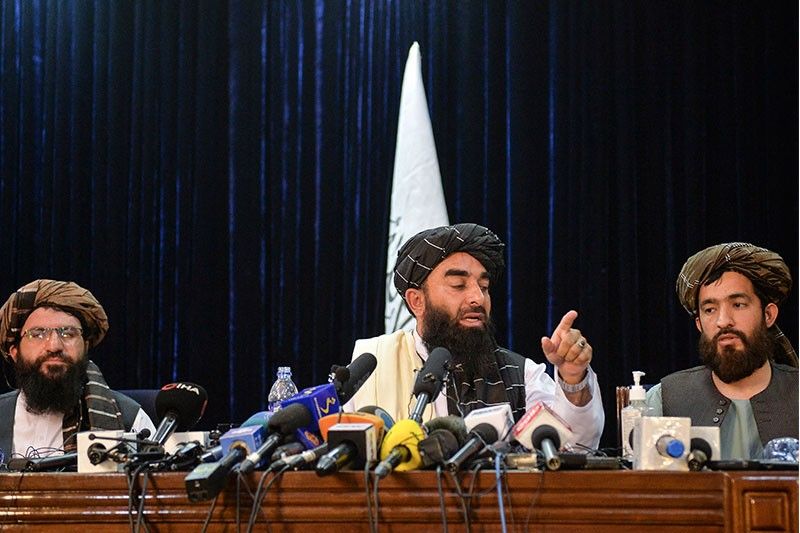Taliban hold political talks, Biden says 'chaos' was inevitable

KABUL, Afghanistan — Senior Taliban members have met with former president Hamid Karzai and senior official Abdullah Abdullah as they seek to form a government in Afghanistan, pledging it will be "positively different" from their brutal rule two decades ago.
But thousands of Afghans and foreigners are still attempting to flee the country, fearful about the hardliners' past record of human rights abuses.
And President Joe Biden — under pressure at home and abroad over his handling of the withdrawal of US forces after 20 years of war — said Wednesday that some soldiers could remain past the August 31 deadline to ensure all Americans get out.
The veteran Democrat also told ABC News that he believed it would have been impossible to leave Afghanistan "without chaos ensuing", defending his actions.
Washington however expressed concern that the militants, who took over the country after a lightning offensive ending in Kabul at the weekend, were already reneging on promises of safe passage to the airport for Afghans wishing to leave.
In the United Arab Emirates, ousted president Ashraf Ghani — who fled as the insurgents closed in on the capital — said he supported negotiations between the Taliban and former top officials, and was in his own talks to return home.
But US Deputy Secretary of State Wendy Sherman said Ghani was "no longer a figure" on the country's complex political stage.
The Taliban have come full circle after being toppled from power by a US-led invasion in the wake of the September 11, 2001 attacks.
The group has pledged not to seek revenge against opponents and to respect women's rights, but the international community is sceptical about those promises.
As the Taliban moves to put a government in place, leader Haibatullah Akhundzada has ordered the release of "political detainees", telling provincial governors to free them "without any restrictions or conditions", the group said.
Taliban negotiator Anas Haqqani met with Karzai, the first Western-backed leader of Afghanistan after the Taliban's ouster in 2001, and Abdullah, who had led the government's peace council, the SITE monitoring group said.
Ghani — who was in the United Arab Emirates, which said it was hosting him and his family "on humanitarian grounds" — said he wanted those negotiations to be a "success".
Protests and gunfire
Taliban spokesman Zabihullah Mujahid said Tuesday that the new regime would be "positively different" from their 1996-2001 stint, which was infamous for deaths by stoning, girls being banned from school and women from working in contact with men.
But while the Taliban leadership tried to project a new image, video footage shot by local agency Pajhwok Afghan News showed protesters in the eastern city of Jalalabad who were carrying the Afghan flag fleeing with the sound of gunshots in the background.
Local media said the residents were protesting the removal of the flags in favour of those of the hardline movement.
And residents in Bamiyan reported that a statue of Hazara leader Abdul Ali Mazari, killed by the group in the 1990s, had been decapitated.
Hazaras have long been persecuted for their largely Shiite faith and were massacred in the thousands during the Taliban's ruthless conquest of the country in the 1990s.
"We are not sure who has blown up the statue, but there are different groups of Taliban present here, including some... who are known for their brutality," a resident told AFP, asking not to be named.
The Taliban astonished the world in 2001 when it destroyed two monumental and ancient Buddha statues in Bamiyan, after deeming them un-Islamic.
Desperation
Afghans and foreigners continued to flee the country Wednesday, with the United States and other nations stepping up evacuation airlifts from Kabul.
Desperate scenes from the airport at the start of the week have created searing images of Afghans terrified of the Taliban, and a diminished United States unable to protect them.
"There was nothing that I or anyone else saw that indicated a collapse of this army and this government in 11 days," US Joint Chiefs Chairman General Mark Milley said Wednesday. "This comes down to an issue of will and leadership."
Biden said the Taliban were cooperating on letting Americans get out but added: "We're having some more difficulty having those who helped us when we were in there."
Sherman voiced alarm at accounts of harassment and checkpoints for Afghan nationals, despite the Taliban's promises not to carry out reprisals.
As for the August 31 deadline for US forces to leave, Biden said: "If there are American citizens left, we're going to stay to get them all out."
Crowds built up outside embassies in Kabul on rumours that governments were offering asylum.
Human rights concerns
The United Nations Human Rights Council said it would hold a special session on Afghanistan next week to address the "serious human rights concerns" under the Taliban.
The European Union, the United States and 18 other countries issued a joint statement on Wednesday saying they were "deeply worried about Afghan women and girls", urging the Taliban to ensure their safety.
Demonstrations have been staged in cities around the world in support of Afghan civilians, and women and girls in particular.
Biden's administration has said it is looking at actions, not promises, in developing its approach to the Taliban.
Russia, China and Iran have meanwhile signalled their willingness to work with the Taliban.
Get the latest news as Taliban gains control of Afghanistan. Photo courtesy of Al Jazeera/AFP
Afghanistan's supreme leader said Sunday the country's women were being saved from "traditional oppressions" by the adoption of Islamic governance and their status as "free and dignified human beings" restored.
In a statement marking this week's Eid al-Adha holiday, Hibatullah Akhundzada -- who rarely appears in public and rules by decree from the Taliban's birthplace in Kandahar -- said steps had been taken to provide women with a "comfortable and prosperous life according to Islamic Sharia".
The United Nations expressed "deep concern" last week that women were being deprived of their rights under Afghanistan's Taliban government and warned of systematic gender apartheid.
Since returning to power in August 2021, Taliban authorities have stopped girls and women from attending high school or university, banned them from parks, gyms and public baths, and ordered them to cover up when leaving home.
They have also barred them from working for the UN or NGOs, while most female government employees have been dismissed from their jobs or are being paid to stay at home.
However, Akhundzada said "necessary steps have been taken for the betterment of women as half of the society".
"All institutions have been obliged to help women in securing marriage, inheritance and other rights," his statement read. — AFP
UN chief Antonio Guterres will gather international envoys at a secret location in Doha on Monday in an increasingly desperate bid to find ways to influence Afghanistan's Taliban rulers. — AFP
The UN Security Council adopted a resolution Thursday calling on Taliban authorities to "swiftly reverse" all restrictive measures against women, condemning in particular its ban on Afghan women working for the United Nations.
The resolution, unanimously adopted by all 15 Council members, said the ban announced in early April "undermines human rights and humanitarian principles."
More broadly, the Council called on the Taliban government to "swiftly reverse the policies and practices that restrict the enjoyment by women and girls of their human rights and fundamental freedoms."
It cited access to education, employment, freedom of movement, and "women's full, equal and meaningful participation in public life."
The Council also urged "all States and organizations to use their influence" to "promote an urgent reversal of these policies and practices." — AFP
G7 foreign ministers on Tuesday demanded the "immediate reversal" of a ban on women in Afghanistan working for non-governmental organisations and the United Nations.
"We call for the immediate reversal of unacceptable decisions restricting human rights and fundamental freedoms, including the latest bans prohibiting Afghan women from working for NGOs and the UN," the top diplomats said in a statement after two days of talks in Japan.
The group also slammed the Taliban authorities' "systematic abuses of human rights of women and girls and discrimination against the members of religious and ethnic minorities".
Taliban authorities triggered international outrage this month after extending a December ban on Afghan women working for non-governmental organisations to include the UN.
They have rejected criticism over the move, saying it is an internal issue that should be "respected by all sides." — AFP
The United Nations is being forced to make an "appalling choice" over whether to continue operations in Afghanistan while the Taliban government bans women from working for the organisation, the world body says.
Under their austere interpretation of Islam, Taliban authorities have imposed a slew of restrictions on Afghan women since seizing power in 2021, including banning them from higher education and many government jobs.
In December, they banned Afghan women from working for domestic and foreign non-governmental organisations, and on April 4 extended that to UN offices across the country.
In a statement Tuesday, the UN mission in Afghanistan said the ban was "unlawful under international law, including the UN Charter, and for that reason the United Nations cannot comply".
"Through this ban, the Taliban de facto authorities seek to force the United Nations into having to make an appalling choice between staying and delivering in support of the Afghan people and standing by the norms and principles we are duty-bound to uphold," it said. — AFP
- Latest
- Trending


































